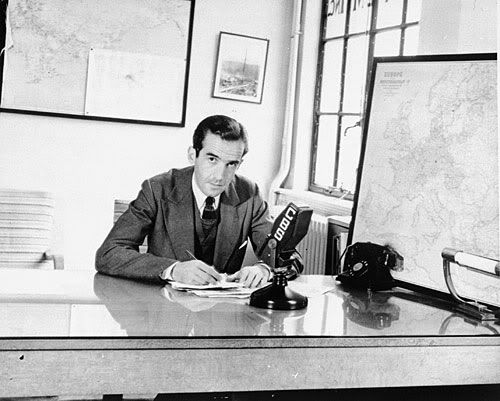
Posted on 08/24/2010 5:06:51 PM PDT by Homer_J_Simpson
Edward Murrow

A full transcript should be showing up about two replies down momentarily.
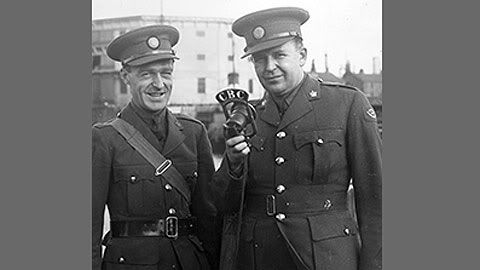
Raymond Glendenning
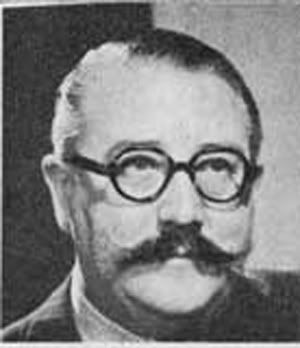
Larry LeSueur
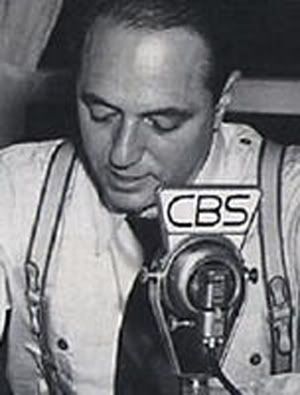
Eric Sevareid
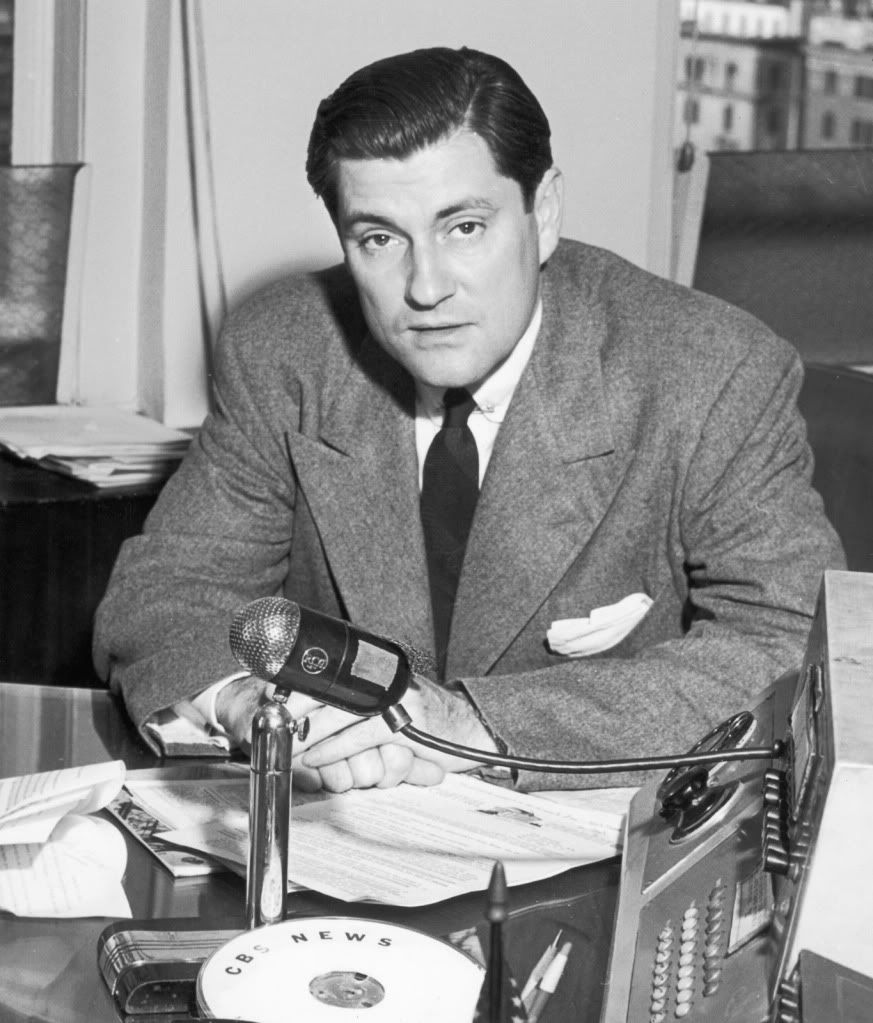
Vincent Sheehan
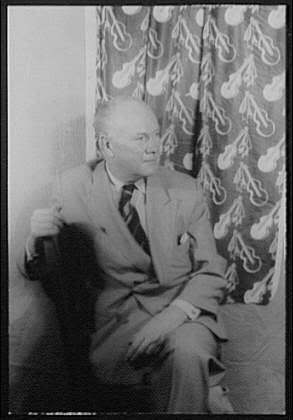
Wynford Vaughn-Thomas
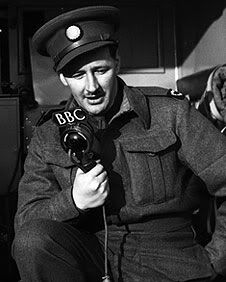
JB Priestley
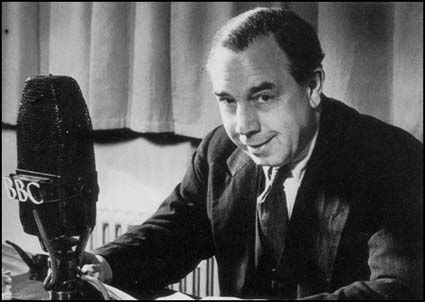
London After Dark
At this time the Columbia Broadcasting System brings you a special broadcast; life in a blackout in the capital of Great Britain. During the next half hour you’ll be in various parts of London, a city which had three air raid alarms today. The nerve center of empire. There will be pick ups from various points in London, accounts of work, yes, and of play in this great city of a nation at war. And so we turn you over to Columbia staff and the British capitol and we take you now to London.
(fade in)…the hub of the British Empire in war time, seen through Canadian eyes, through English eyes, and through American eyes. London at work and at play from the unceasing grind of England’s war effort to the relaxation of the crowds off duty. Come with us round London after dark in war time. (fade to music)
(music fade out)
Canada’s Sandy McThurson has led off our tour though London at the consul at the theatre organ in St. George’s Hall. Notable as the home of magic in the London of Queen Victoria’s day. And now we take you into the streets of blacked out London. Down stately crescent shaped Regents Street, along Shaftesbury Avenue of theatre fame into Charing Cross Road, London’s tin pan alley and so to Trafalgar Square. Looming there is Edward Murrow, known to you as Columbia’s European director. Come in Ed Murrow.
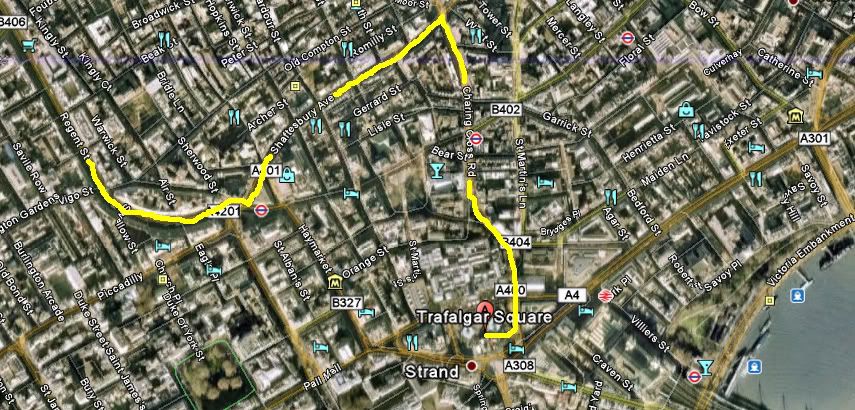
(sounds of sirens)
This is Trafalgar Square. The noise that you hear at the moment is the sounds of the air raid sirens. I’m standing here just on the steps of St Martin’s in the fields. A searchlight just burst into action, off in the distance. One single beam, sweeping the sky above me now. People are walking along quite quietly. We’re just at the entrance of an air raid shelter here and I must move this cable over just a bit so people can walk in. I can see just straight away just in front of me Lord Nelson on top of that big column. There’s another searchlight just square behind Nelson’s statue. I’ll just let you listen to the traffic and the sound of the siren for a moment. (audio drops for about 10 seconds)
…casually, a man stops in front of me to light a cigarette. Here comes one of those big red busses around the corner. Double deckers they are, just a few lights on the top deck. In this blackness it looks very much like a ship that is passing in the night and you just see the portholes. There goes another bus, more searchlights come into action. You see them reach straight up into the sky and occasionally the catch a cloud and seem to splash on the bottom of it. The little traffic lights here, just a small cross on the normal globe are now red; the cars pull up and stop. I’ll just ooze down in the darkness here along these steps and see if I can pick up the sounds of people’s feet as they walk along. One of the strangest sounds one can here in London these days or rather these dark nights; just the sound of footsteps walking along the street. Like ghosts shod with steel shoes. A taxi draws up in front and stops; just waiting for that red light to change to green while the sirens howl. There it goes and the cars move off. More search lights are in action. We have not yet seen any burst of anti-aircraft fire overhead. And of course this doesn’t necessarily mean that are planes actually over London at this moment, we’ve had these warning before of course. You can hear the sirens just dying away in the distance now. An air raid warden walks out of this shelter, this shelter here you know is the crypt underneath this famous old church just on the edge of Trafalgar Square. The crypt where in days of peace homeless men and women were able to find a night’s lodging. You can just here now the steps of people coming up into this old church…
And so, farewell Trafalgar Square. And now, after that unexpected air raid warning we going to take you to one of London’s most ultra hotels. Where behind the blackout drapes men and women are dancing in the main ballroom. We’ll see what the effect is over there after the air raid warning.
(music playing)
(band leader makes announcement on air raid siren)
(music resumes)
(music fades)
And so, just after the air raid warning is announced, the dancing goes on at the Savoy Hotel. The Savoy of course is one of London’s most famous hotels, upstairs are suites named after the Gilbert and Sullivan Savoy Operas. Below stairs are the kitchens and cellars, and even in war time London, few spots are busier on a Saturday night, air raid warning or not, than the Savoy kitchen. Bob Bowman of the CBC is stationed there now, with a Savoy chef, Monsieur Latry; take over will ya Bob.
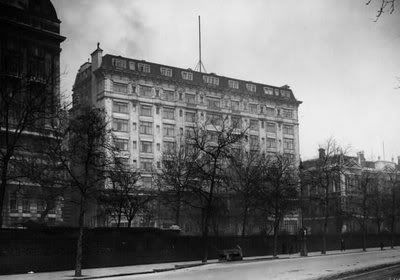
(music playing)
Hello you (undecipherable), we are switching you now from the upper dance room down to the kitchen here and what you’re hearing is not excitement because of an air raid, but just the busy orders providing people with meals there. And of course I’m sure your all licking your lips because this kitchen as probably a lot of you will know is provided over by no less a person than Francois Latry who certainly, one of the most famous chef in the world. As a matter of fact, his culinary ability has brought him honors from many parts of the world. He’s a chevalier of the French Legion of honor and he also is a holder of the Order of the Cordon Rouge which was established by Queen Mary. Well tonight he’s presiding over this white tile kitchen with its red floors. His battery of chefs and flying black coated waiters, who are serving those people who are staying on right now, staying on and still dancing upstairs. It’s war time and we have rationing, nevertheless, I don’t think you’d notice any difference at all. The menu tonight includes eight hors d’oeuvres including caviar, eight different kinds of meat and game, and nevertheless I don’t want you to think that we’re living luxuriously, sort of out of keeping with the war effort. Printed in red letters on the menu is this sentence: “By agreement with the Ministry of Food, only one dish of meat or fish or poultry may be served at a meal.” Still that’s not a great hardship is it, not to be able to have both fish and meat, and even at that the genius of Mr. Latry comes into effect because he’s designed marvelous (French dish) and (another French dish) as he calls them, which have a fish base and which can be served before the main course. Things like…things like Crab Maryland and all that sort of thing. Well, here he is Francoise Latry in his tall white cap. Francoise Latry one of the worlds most famous chefs.
I’m very happy to say hallo to my friends across the Atlantic, and to tell them we are well, and food is plentiful. The war has not effected my cooking.
Well, hasn’t the war made any difference at all?
Not at all… (fades out)
But not all London’s enjoyment. These are dangerous days, war time days and not for an instance can the watch on London be relaxed. As for example, the air raid warning we had a few minutes ago. And so unobtrusively guarding the city as crowds go home, or as people sleep or night workers start their shift in armament factories, anti-aircraft guns are posted; searchlight batteries reading in an instant to pierce the sky. Somewhere in London at this very moment, Raymond Glendenning of the BBC is stationed at an anti-aircraft gun post, and we’ll here from him now.

Well here, standing as I am beside the command post of an anti-aircraft battery somewhere in London, I’m able to give you a picture of Britain at war; Britain in action. Beside me at the moment, are many khaki clad figures all with steel helmets and with their gas masks at the alert. Just over ten minutes ago, the sirens sounded warning civilian populations that an air raid was in progress. Before that the alarm has been given here and men had rushed from the huts where they were sleeping to their posts manning the four guns, each in its own emplacement, and this central control point. The working of an anti-craft unit is entirely done from the command post. The instruments are on either side of us, as I stand here just beside me is the spotter on the identification telescope which is first able to locate the plane in the beams of the searchlights. At the moment, our actual…enemy planes are no longer in our vicinity. We know the Germans are overhead, but they’ve seem to have gone away from us now to northward and at the moment the spotter is only using a pair of binoculars. And so there are the searchlights which, but a few seconds ago, were zigzagging across the sky, stabbing in all directions a myriad shafts of light looking for those enemy planes. They’ve all gone out one by one as the plane have passed on its way and we’re left here with the men just on their incessant vigil. This is just one of the pieces of practical turnout that they do at anytime during the twenty four hours and have been waiting to do at anytime since this war started. Now beside me is this spotter identification telescope which is, soon as the searchlights will get onto an enemy plane, will locate it. From that we will call the bearings and the angles of sight which will enable a remarkable machine called a predictor in the left pit to get onto the plane, follow the target, and locate the guns. Now here is the command from the GPO, who is the gun position officer, the predictor works its way around, the men are all standing at attention and now in this dim light I can see four long tapering gun barrels staking ground until they come around to their acquired bearing which is in the direction of the expected enemy. Beside me the height finding apparatus which this time is on my right in the pit on my right is now calling out the height at which the enemy is expected to come. I now hear the distant drone of planes, searchlights stabbing and crisscrossing, cross the clear sky and into the cloud and out again. There some distance away at the moment. All there is here is absolute tenseness and vigilance.
That was an anti-aircraft gun post and no less vital than searchlight units and anti-aircraft batteries is another now familiar aspect of the London war times scene; air raid precautions known simply as ARP. And so next we are going to take you to an ARP post just a few minutes after an air raid warning has sounded. Where Larry LeSueur of CBS is waiting to set the scene as he sees it.
Good evening, this is Larry LeSueur. The London air raid sirens have just sounded. I’m standing in the vast basement of one of the largest apartment houses in the world. Around me are about a hundred people. But they are only a small fraction of London’s great air raid precaution force. Which is read to push to the scene if bombs are dropped in this area. This is the organization, the one which the British gift for reducing everything to initials have shortened until it is simply called ARP.
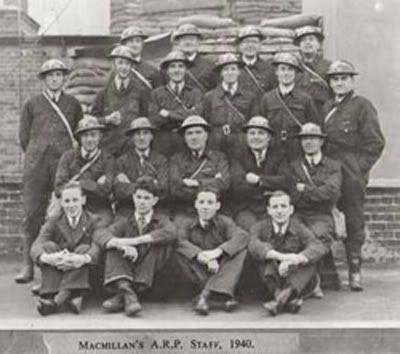
These ARP men and women are the ones who are standing by to help their fellow Londoners when the air raid sirens just sent the others 8 and a quarter million into the air raid shelters. As I said before the sirens are just sounded and here’s how the mechanics of this great air raid precaution system worked. Perhaps some half dozen German bomber pilots penetrated the coastal defenses of Britain a few minutes ago, and their heading for London. There may be only a half dozen of them, but the killing powers of each man has been multiplied to incredible limits by science and high explosive bombs. An observer in a lonely observation post spotted these German raiders coming over. He telephoned the information to the Air Force Fighter Command. And the Fighter Command determined what point the raiders were heading for; it was London. And they phoned the London Control Center a few minutes ago. And that telephone message was passed on to the place where I’m standing now; about 10 minutes ago. The message said simply, “Air raids message yellow.” The word yellow stands for the same thing it does in traffic signals be on your guard. Everyone here grabbed up their equipment and stood up expectantly with a keen look on their faces and men and women both. Then the telephone rang again. The words came through, “Air raids message red.” And a few minutes later the agonizing wail of London sirens began rising and falling in their quavering note. The people in the ARP station all got their equipment ready now and they started the motors of their first aid cars and their ambulances. The doctor on duty is busy sterilizing his instruments and preparing his bandages. The German bombers may be near by now, there’s a drone of engines in the air. I can’t tell though if they are British or German planes. If a bomb drops in this ARP district, a telephone call or messenger will instantly bring the news of its location. And each of these blue uniformed ARP men and women, carrying their full equipment, which consist of steel helmet, gas mask, lab clothing, boots, first aid equipment and flashlight, will be driven to the scene in ambulances at fire engine speed. Now for your benefit, Mr. William Sutton, superintendent of this ARP bureau has arranged for a practice air raid bombing call to arrive at this station. Although no bombs have been dropped nearby, so far as I know. We’ll see how long it takes for his men and women to get going. There goes the telephone now.
Air raid message red. Stretcher bar ten one, stretcher party, one ambulance, one car, to 114 High Street sector two-two-O. Messenger!
(sounds of ARP unit organizing and moving out)
They’re all in the cars now. They’re out of the station already, they’ve gone!
Well you’ve just heard the way that two vital spots in London’s defense systems reacted to an air raid warning. But now let’s get back to the bright lights, away to the west, to the Hammersmith Palais, London’s giant dance hall. We’ll see what’s happening out there now that the sirens have sounded and we’ll see and hear it from Columbia’s Eric Sevareid who’s standing with his portable microphone in the thick of the crowd.
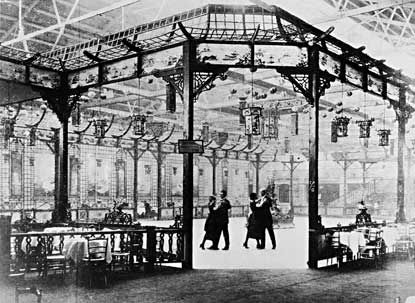
(music plays)
I’m standing in the middle of a great big dance floor. I guess it’s the biggest in England and it’s got the biggest crown I’ve ever saw trying to dance at one place at one time. There are 1500 people in the place at the moment. It’s fifteen minutes before midnight and that’s the war time closing hour for Saturday night. There was an air raid alarm as you know fifteen minutes ago. The orchestra leader simply announced they’d go on playing if the crowd wished to stay and I don’t think more than a half a dozen people have left. They simply put up a big cheer and went on with their song. Eddie Carol’s orchestra’s playing a song called A Nightingale Sang in Barkley Square. This crowd knows this song and judging from the last one (undecipherable) to Ol Johnny. We’re a long way from Barkley Square where 6 penny bus rides from the heart of London. They come to here by bus and subway. This is not Mayfair, nobody comes here to be seen or to see, they come to dance for the pure pleasure of dancing. And any American that thinks the British are phlegmatic race should see them dancing around me here tonight. They love dancing and they (undecipherable) these workers, these grocers, clerks, these people who make up the stuff of England, they dance wonderfully well. They are not all English by a long ways. The New Zealanders, Australians, and Canadian soldiers and sailors are here and I just met a couple of Texans now in the R.A.F. There a few French and Polish soldiers and there right in front of me is a brave looking Dutch officer in his well tailored green just gliding past. When they come in these men take off their army boot and are given little black dancing pumps. This was a dance place at the end of the last war.
Well it seems that it takes more than an air raid siren to dampen the gayety at the Hammersmith Palais. But now another long hop back to London’s west end from west to east to the hub of the universe, center of cosmopolitan life in happier day which we hope will soon return. We’re taking you to London’s heart of hearts, where on a balcony, stories about Piccadilly Circus; Vincent Sheehan of CBS is standing to describe Piccadilly after an air raid warning.
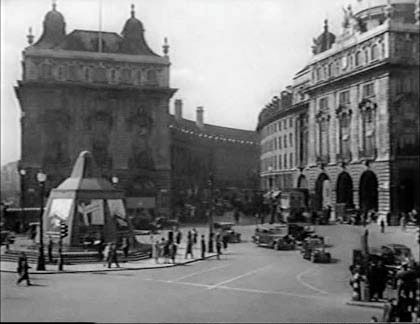
(sound of traffic)
I’m standing on the balcony on Piccadilly. Ah perhaps I should tell you exactly where. It’s the Piccadilly Hotel about 150 yards from Piccadilly Circus a little bit beyond St. James’ Church. Um, as you know I suppose, I don’t know if you heard the siren, but there is an air raid on. Um, an air raid alarm that is ten or fifteen minutes ago there was plenty of traffic in this street, even in spite of the blackout. Um, now, good deal of it has gone up to the curb or disappeared one way or another. People, I suppose a good many of them have gone into shelters. And it’s a little bit quieter than it usually is. Even in spite of the blackout and these alarms which people in the center of London don’t usually hear much of, Piccadilly is still the center of the shopping and the theater and café and restaurant life of London. I had dinner not long ago in a restaurant just off Piccadilly Circus where there were Hungarians and Austrians playing their music. Much as usual the food didn’t seem much different nor did the crowd except there were a lot of officers, um people on leave from the army and the navy Saturday night. They played Viennese Waltzes and other music of those countries which no longer are able to play their music. The traffic, um, seems to be not very much disturbed by the air raid. We got taxis and you probably can hear them, I don’t know whether you can hear or not, the busses still going one, some of them. The moon has just come up over the black buildings over there on the other side of Piccadilly Circus, the Criterion Restaurant. And uh, the searchlights which a few minutes ago were stabbing the whole sky with great beams seem to have disappeared altogether.
Well that was Piccadilly in the blackout during an air raid warning. And now from Piccadilly we take you to a London terminus. Smokey, sprawling Euston Station. It only costs a penny to buy a platform ticket which allows us to mingle with the travelers who are about to leave for night rides north. And at Euston we are going to hear from Michael Standing and Wynford Vaughan-Thomas, both of BBC.

Well you’re on number 13 platform at Euston Station and let me tell you right away the air raid warning has had very little effect here except to slow things down and quite things down a bit. The platform scene there’s only those very faint blue lights, blue disks lighting up the numbers of the platform, a few little dim red lights and otherwise complete and abysmal darkness. Well we are here on this platform to watch the 11:55 up to Manchester start off on her journey. She’s got a couple of minutes yet before she starts off and she drawn by the Royal Scott No.6100, you’ve seen that (undecipherable) clumsy beauty out there in the United States and Canada some seven years ago, and now here she is taking care in her home country and going to draw eleven coaches and a complement of passengers on a routine journey up to the north. Well Euston is a fairly busy place in this wartime as the station most of us (undecipherable) that’s right isn’t it?
Very. Very. Just, just the present time uh, practically uh, 50 percent of our main line trains today have been judicated. Incidentally, within the last two hours we’ve dealt with approximately 200 tons of newspaper traffic which is going all over the British Isles.
As we watch the newspapers being loaded up, tomorrow morning newspapers being taken up to the north. Well now this train has a moment or two before she is due to leave and so let’s spend that moment or two pushing through the doors of the YMCA Canteen and see what’s happening in the canteen.
Well here in the canteen we’ve had a constant stream of men in uniform coming in off of the night, sailor from journeyman ships and sailor piled high with rifles and equipment and they always seem to move for that quick cup of tea. Well they’ve been getting it to with top book efficiency because the canteen’s been run by an American lady, Mrs. Luce. Well, she’s got her job on alright, everyone in the services turns up here sooner or later and they get not only tea, quick meals just like burly seaman Bob Smith who has taken in here all night, what are you eating Bob?
Well I got some egg and chips and really enjoyed it, been servin all day but you get plenty of food in this country so there’s not too much to worry about long as you get good feed.
Well that’s largely due to a seaman like Bob Smith that we’re getting that food but pal who is Sether Helen, he’s also been taking in.
Yes, we’ve had a jolly fine evening here we’ve had eggs and chips and plenty of tea, that’s the main thing. As long as we get something to drink and some good food.
And they’ve got that, it takes more than bombs to stop these boys from getting to this canteen and it takes more than bombs to stop that 11:55 going out. And we take you back to the platform now to see if she’s getting out on time. We paused for the moment and we are just waiting for the guard to swing his green lamp that’s going to set this mighty giant train in motion. And here he is, he comes stumbling along back to the van, of the rear of the train, and in a moment she’ll be starting off on her journey for to the north. There’s a little activity, all the doors are closed, all the windows of course are blacked out and in a moment or two she’ll be pounding away through a blacked out Britain up to Manchester which she’ll reach in about four hours time. So a moment or so, she’s just a trifle late, of course this air raid alarm has delayed the arrival of some of the goods that are to being carried on her and the last block of newspapers was only piled into a van just a moment or so back. Is she going to start on time?
Well, haven’t got the road yet.
She hasn’t got the road yet.
(conductor continues speaking from a distance)
She may be a moment or two late but… (whistle blows) you see there goes the whistle. And I don’t know if we’ve got time to see her chop out, I don’t think we have (fades)
Well, seem the only effect of that air raid warning at Euston Station was to make a train a couple of minutes late. And now to our final port of call, standing in the shadow of the Cenotaph, monument to the fallen of the last Great War is someone who needs no introduction to you wherever you may be. To close our tour of London After Dark and London in an air raid warning, J.B. Priestley.
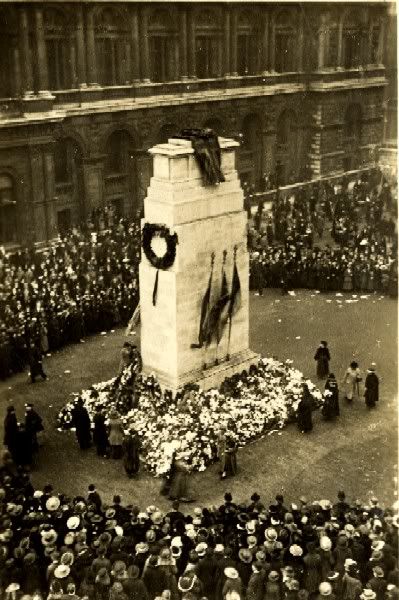
I’m sitting at an open window in Whitehall. The roar of traffic has dwindled to the few noises you probably hear because of course to the air raid warning. We still get a few busses passing, a few cars. Just opposite me is tall pale rather ghostly shape of the Cenotaph commemorating a million dead. Many of them friends of mine; boys that I played with as a boy. Men that might have been leaders now. Behind the great government offices, the home office, the colonial office, the treasury. It’s the heart of our great capitol city. It’s also historic ground. Henry VIII married Anne Boleyn near here. Elizabeth saw Shakespeare’s plays and the masks of Ben Johnson near here. Charles the First was executed a few yards from where I’m sitting. Its historic ground and I think today it’s probably more deeply sunk in our world’s history than ever. Because it is the very center of the hopes of free men everywhere. It’s the heart of this bastion, this great rock, that defying the dark tide of invasion that’s destroyed freedom all over Western Europe. Soon I hope the all clear will come. Soon I hope London, which has worked hard all this week, can go quietly to bed and go to sleep. I hope it will dream of a better world. A world when we could take the balloons out of the sky and the planes. Dream that dream and not sleep too long, but make that dream of a better world come true. Goodnight. (Big Ben tolls)
And that’s London after dark. London in the blackout, London in the midst of an air raid alarm. The world’s largest city at midnight with air raiders in the vicinity. As this broadcast opened a half hour ago, the sound of sirens was heard. London’s fourth air raid alarm of the day. Sirens wailing and descriptions of searchlight beams fingering the sky. You were taken from point to point in this London under alarm. The defenses of London were manned but the nightlife continued and the dance bands played on. The CBS staff in Britain and the British Broadcasting Corporation brought you the eyewitness story of this city at war.
This is the Columbia Broadcasting System.
This is an amazing program. Thank you so much, Cougar.
Wow!
BUMP!
One of the names you don’t see much when you read about the CBS broadcasts from London is Paul W. White. He was the real hero. He was the guy who ‘made the trains run on time.’ He was the CBS’s first Director of News. I just finished his book.
http://en.wikipedia.org/wiki/Paul_White_%28journalist%29
NEWS ON THE AIR RADIO BROADCAST HISTORY PAUL WHITE 1947
Wow!
Just compare this to the usual emptiness of the MSM today.
This really is an exciting piece of programming. In the days before television media and at a time when people usually got their news from the paper (as we do) and from movie house news reels, this is a real masterpiece of journalism. They took the pains to really get the feeling of what was happening over in Britain across the sea and into the minds of the American citizen.
I make a habit of opening my daily paper here on these threads with a clear mind the first time I read them. In doing so I'm trying to capture the feelings that the average American felt as they read of these events unfolding in front of them. When applying this attempt (it's impossible to do completely) to this broadcast it really did bring home some of the uncertainty of what was going on over in Europe.
When I came across this quote while trying to get perspective while doing the transcription, I think it really captures what I felt, and what perhaps many Americans felt after a broadcast like this:
You burned the city of London in our houses and we felt the flames. You laid the dead of London at our doors and we knew that the dead were our dead ... were mankind's dead without rhetoric, without dramatics, without more emotion than needed be. You have destroyed the superstition that what is done beyond 3000 miles of water is not really done at all.— Librarian of Congress, Archibald MacLeish
Back when we had real journalists who knew how to paint a picture with just their words.
That was really terrific.
Thanks.
So do you think this was really broadcast live as they moved around the city? If so they picked a great night for it. As we will see in the morning the 24th was a turning point in the BoB. Some bad navigating led a flight of German bombers to unload right in London. That must have been the heaviest bombing to date in the city.

I'm not sure. I don't see why not. At the beginning of the broadcast the New York announcer claims 3 air alarms over London that day only to move to Murrow during an alarm. It then closes in saying they broadcast during the fourth air raid alarm of the evening. Every broadcaster makes reference to the air raid so the time line is probably pretty tight at least from broadcaster to broadcaster.
It would depend on when this was broadcast in New York. First lets set up the time difference. New York has daylight savings time. This is why the Elmer Davis reports that we have done this summer start with the phrase "8:55 pm Eastern Daylight Time". For those who don't know, Daylight Savings was established in the U.S. during World War I in public law number 106 dated March 19th, 1918. This set up daylight savings to start on the last Sunday of March and continue to the last Sunday of October (Public No. 106). This law was repealed after World War I since it was so unpopular, but some places kept using it including Massacheusetts, Rhode Island and large cities including Chicago, Philadelphia and New York. In Britain they have what is called British Summer Time. The current dates for them were set up by the Emergency Powers Defense Act of 1939 with S.R.& O. 1939 No. 1379 of October 5th 1939 setting the end date at the 3rd Saturday in November and S.R.& O. 1940 No. 172 of February 6th 1940 setting the beginning at the 4th Saturday in February (more here).
So that means there was a 5 hour time difference between New York and London. So if it was live then it had to begin at 6:30pm EDT in order to fit the time line. Not unreasonable.
Great stuff!
Disclaimer: Opinions posted on Free Republic are those of the individual posters and do not necessarily represent the opinion of Free Republic or its management. All materials posted herein are protected by copyright law and the exemption for fair use of copyrighted works.